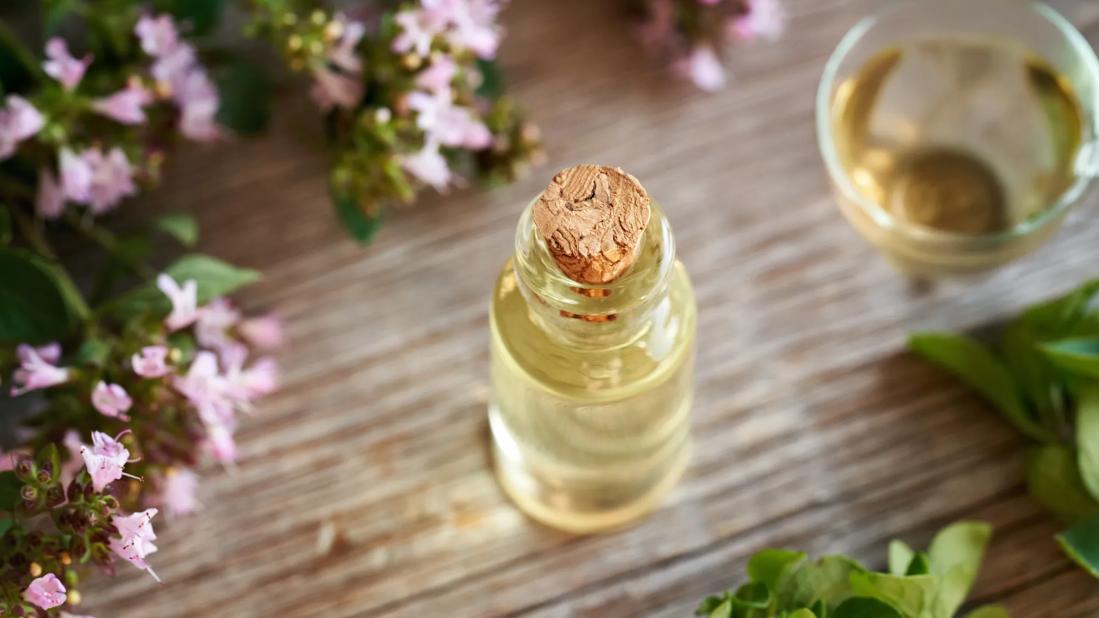The commonly used herb may reduce inflammation, fight bacteria and help manage stress

You know oregano as an herb commonly used in food — think Italian and Mediterranean cuisine. But while it can add a punch of flavor to dishes, it may also boost your health by reducing inflammation, fighting bacteria and taming stress.
Advertisement
Cleveland Clinic is a non-profit academic medical center. Advertising on our site helps support our mission. We do not endorse non-Cleveland Clinic products or services. Policy
“Oregano contains a variety of antioxidant compounds,” explains registered dietitian Devon Peart, RD, MHSc. “It’s been used in traditional medicine for a range of ailments.”
But what does the research show? Peart walks us through the potential oregano benefits.
Oregano is commonly used fresh or ground to flavor dishes. But there are also other forms of the herb used in different ways:
You may sprinkle oregano here and there on your dishes. But beyond bringing the flavor, the herb may also offer the following health benefits.
Found in plant-based foods, antioxidants are chemical compounds that fight damaging free radicals in your body. Antioxidants found in oregano include:
“In studies, the consumption of dietary flavonoids and phenolic acids has been associated with decreased risk of chronic diseases,” reports Peart.
Advertisement
Oregano also contains flavones, a subclass of flavonoids, that offer antibacterial properties, says Peart. More research is needed to see how this may benefit people.
The antioxidants carvacrol and thymol may have antiviral properties to protect your body from viruses like norovirus and herpes simplex virus. But Peart points out that the research on this has been limited to lab studies.
Inflammation can contribute to diabetes, heart disease and other medical conditions. While lab studies show some promise around how oregano may reduce inflammation, more research is needed.
A few lab studies show a connection between oregano and its ability to improve anxiety and depression. “No human studies have been conducted, but there’s some potential that oregano may be helpful for stress,” clarifies Peart.
Peart says drinking oregano tea (which is caffeine-free) may come with potential antimicrobial and antioxidant benefits, according to lab studies.
“It’s believed to support digestion,” she continues. “The chemical compounds in it may stimulate digestive juices that help break down food more efficiently. It’s also considered an anti-spasmodic, which means it helps relax the muscles of the digestive system, so that can be helpful for digestion.”
Peart adds that oregano tea may also help relieve bloating and gas — and help maintain healthy gut bacteria. “But again, human studies are lacking,” she notes.
Older research shows that oregano may help manage diabetes and even prevent the disease. But newer research points out that those results were lab studies and that human research is needed to fully understand how oregano may help with diabetes.
As the antioxidants found in oregano have the potential to fight free radicals, there have been questions around whether the herb could have anti-cancer properties. While initial research shows some promise, Peart stresses that human studies are needed.
While oregano is safe to consume in food, Peart says it’s not recommended as a supplement or as a tea if you’re pregnant or nursing. Oregano oil, essential oil and supplement side effects may include:
“It can affect or slow down how your blood clots,” warns Peart. “It’s something that should be avoided before or post-surgery.”
Tannins found in oregano may affect how your body absorbs certain minerals, like iron, copper and zinc. If you have a vitamin or mineral deficiency (say, you’re low in iron), it can interfere with and prevent your body from absorbing those vital minerals.
Advertisement
“If you’re taking an iron, copper or zinc supplement and you’re considering taking an oregano supplement, you would want to take them at least two hours apart,” advises Peart.
“Oregano has compounds that inhibit some enzymes involved in blood sugar regulation,” explains Peart. “It may also interact with diabetes medications. If you’re already on medication that’s lowering your blood sugar, it could potentially lower it too much.”
More research is needed to fully understand how oregano supplements may affect your blood sugar.
Some people may experience an allergic reaction when oregano essential oil is applied to skin.
“If you’re rubbing oregano oil on your skin, it can cause allergic dermatitis,” cautions Peart.
There’s still so much to learn about how oregano and oregano tea can boost your health, as well as the possible oregano oil benefits.
So, go ahead and add a sprinkling of oregano to your pasta. But if you want to try oregano oil, essential oil or a supplement, Peart emphasizes the importance of talking to a healthcare provider first.
“Medications or underlying health conditions can affect the way that we metabolize supplements and can interact with the supplement,” reminds Peart.
Advertisement

Sign up for our Health Essentials emails for expert guidance on nutrition, fitness, sleep, skin care and more.
Learn more about our editorial process.
Advertisement

The tropical fruit is a good source of antioxidants and vitamin C

High amounts of cholesterol and saturated fat in red meat may be linked to heart disease

The leaves and pods from this tree are rich in essential nutrients

This starchy root vegetable is a staple in many global cuisines — but it has to be prepared correctly, or it can cause serious concerns

These delicate green sprouts can give you an extra dose of vitamin K and other nutrients — but they’re not safe for everyone

Edamame, lentils and chicken breast are good sources of protein

Eating this root vegetable can help support your eye, heart and brain health

The flavorful herb is full of antioxidants that may help regulate blood sugar

Even small moments of time outdoors can help reduce stress, boost mood and restore a sense of calm

A correct prescription helps your eyes see clearly — but as natural changes occur, you may need stronger or different eyeglasses

Both are medical emergencies, but they are very distinct events with different causes